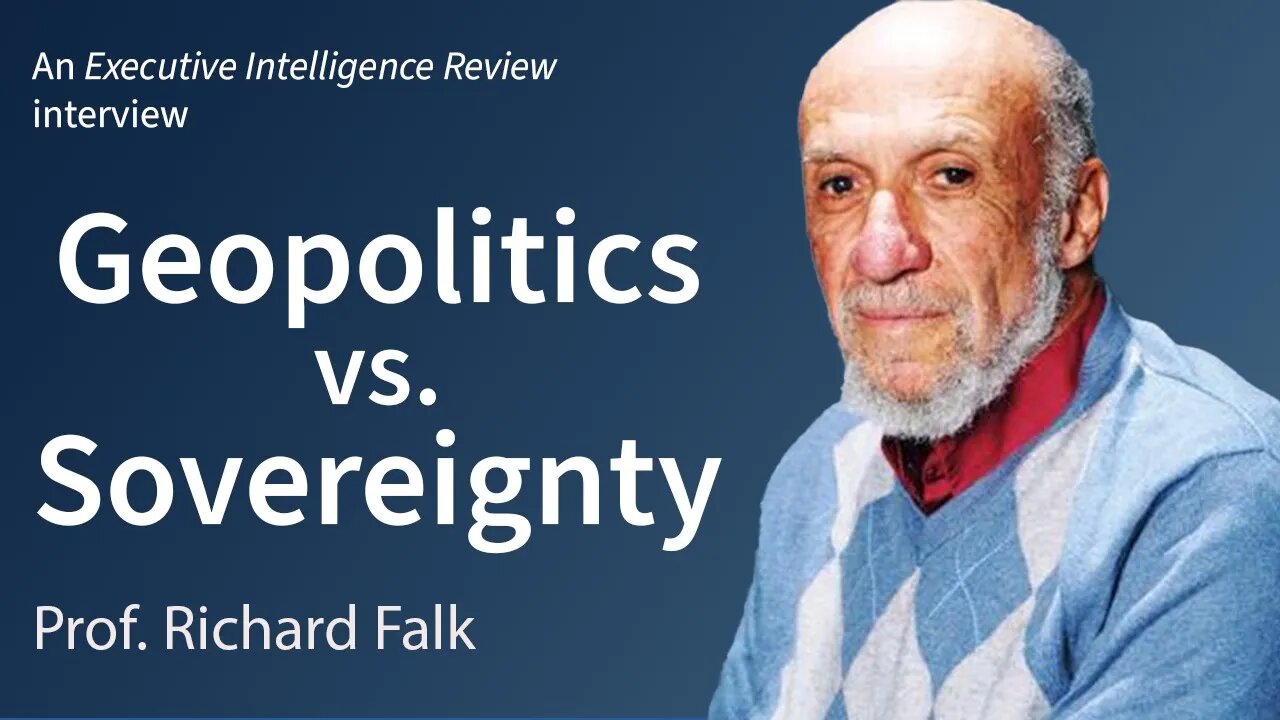Premium Only Content

Geopolitics vs. Sovereignty — Interview with Prof. Richard Falk
Full trasnscript is available here: https://schillerinstitute.com/blog/2023/09/12/interview-with-prof-richard-falk-geopolitics-vs-sovreignty/
Mike Billington of Executive Intelligence Review interviews Prof. Richard Falk
Sept. 5, 2023 (EIRNS)–This is Mike Billington with the Executive Intelligence Review and the Schiller Institute. I’m pleased to be here today with Professor Richard Falk, who has agreed to an interview about current affairs and world developments in this crucial moment in history. Professor Falk, would you like to say a few words about your own history and your role in history?
Prof. Richard Falk: I’m not sure I have a role in history. I’ve taught at universities all of my adult life, starting with Ohio State in Columbus, Ohio, in 1955, moving to Princeton University, where I stayed for 40 years, retiring in 2001, and since then I have been connected both with the University of California, Santa Barbara, and the Queen Mary University in London. I’ve done a fair amount of writing over the decades, including a memoir called Public Intellectual—The Life of a Citizen Pilgrim—along with a stream of commentary on global issues. I have led at times a confusing life, which accounts for the bewildering title, I suppose. I have been active through the UN in supporting the Palestinian struggle for human rights and self-determination, and served as UN Special Rapporteur for the Human Rights Council on Occupied Palestine between 2008 and 2014. During this period I was frequently defamed as an anti-Semite and self-hating Jew and otherwise targeted and discredited. Recently, I’ve continued more quietly to write for publication, including a book of poems, Waiting for Rainbows, splitting my time between Turkey and the US.
I suppose this is enough by way of introduction, maybe more than enough. I would just add that I’m glad to do this interview with Mike Billington, although I’ve had severe differences with the Lyndon LaRouche movement in the past. I’ve also been a target of what I consider their defamatory attacks connected with my support for the pro-democracy, anti-Marcos movement in the Philippines and the insurgent campaign for the protection of human rights in Iran. Such disagreements persist. Despite this I feel that those who seek a safer, more secure, more peaceful and just world have to let these bygones-be-bygones and collaborate in the present for the good of humanity and future generations.
Mike Billington: Well, that’s quite interesting. You and I have discussed privately those differences, which we maintain as differences, both in regard to the history and other aspects of things. But they don’t necessarily have to come up today unless you wish to bring them up further.
Let me start by referencing the fact that you were a speaker at an event sponsored by my friend Chandra Muzaffar in Malaysia, the head of Just International, organized by an organization called SHAPE, Save Humanity And Planet Earth—along with other speakers from the US, from China, from Korea, and from Australia. You referred to what you called the “unstable tension between geopolitics and self-determination,” which I found to be the most profound point of that conference. Could you comment on that and explain what you mean by that?
Prof. Falk: I will try. I’ve been preoccupied with geopolitics in the context of the Ukraine War, which started as a Russian attack on Ukraine, transformed itself, due to the intrusive role that US NATO forces played, into what I call a “geopolitical war” between Russia and the United States, in which the outcome in Ukraine was subordinated by stages to the strategic goal of inflicting a geopolitically significant defeat on Russia, and at the same time to send a warning signal to China not to attempt, with respect to Taiwan, to do the same thing that Russia has tried to do, at least that it was alleged to be trying to do.
My specific connection of self-determination with these issues arose from my sense of the Vietnam War and its outcome, how the US, so predominant militarily, managed, despite a huge investment over a long period of time, to lose the war. That, I think, has been responsible in part for the decline of the US, in part the result of many years of overinvestment and overreliance on military solutions and military approaches to international problems, coupled with an underestimation of the forces of national self-determination, which in Vietnam showed they prepared more patiently to pay the costs and devise effective tactics of resisting efforts of an imperial intervenor to suppress the basic rights of a people in a historical period of decolonization. What I fear in the present context is a similar exaggerated reliance on militarism as a solvent for international problems and an activation of a variety of nationalist responses dangerously intensifying geopolitical warfare, and posing unacceptable risks of a nuclear confrontation..
-
 LIVE
LIVE
Akademiks
39 minutes agoMeg Thee Stallion Back LYING again? Offset vs Finesse2x. 6ix9ine house robbed.. HERES WHO DID IT
1,010 watching -
 LIVE
LIVE
TimcastIRL
2 hours agoGOP Rep Threatens Hillary Clinton With CRIMINAL CHARGES Over Epstein | Timcast IRL
6,476 watching -
 LIVE
LIVE
Laura Loomer
2 hours agoEP157: Marjorie TRAITOR Greene Turns On Trump
1,258 watching -
 1:35:44
1:35:44
Tucker Carlson
2 hours agoWhy Is Nick Fuentes So Popular? Nikki Haley's Son Explains.
39.3K249 -

T-SPLY
1 hour agoProtesters Clash With Border Patrol In Charlotte!
4.35K2 -
 LIVE
LIVE
ThatStarWarsGirl
58 minutes agoTSWG LIVE: I'm Back From My Channel Strike! Let's Discuss The Elephant In The Room
167 watching -
 LIVE
LIVE
I_Came_With_Fire_Podcast
12 hours agoAmerica's Hidden War | The Propaganda Through Line | An Ally Aids an Enemy
172 watching -
 2:14:16
2:14:16
TheSaltyCracker
3 hours agoDEMs Have Real Bad Week ReeEEStream 11-19-25
96.9K125 -
 LIVE
LIVE
SpartakusLIVE
4 hours agoNEW Redsec UPDATE || STACKS OF LOOT LATER?!
292 watching -
 2:34:17
2:34:17
Barry Cunningham
4 hours agoMELANIA TRUMP AND USHA VANCE VISIT MILITARY FAMILIES | DEMOCRAT SEDITION & MASSIVE HYPOCRISY
38.1K13